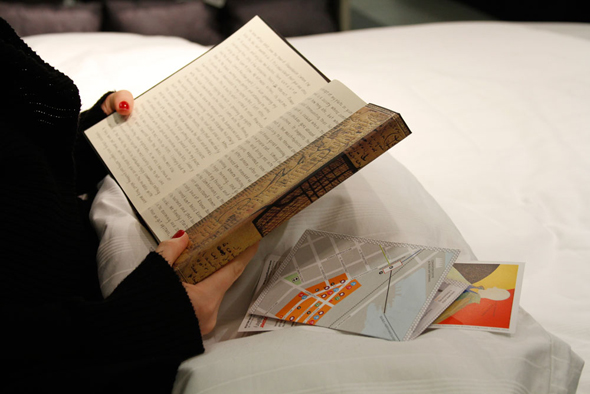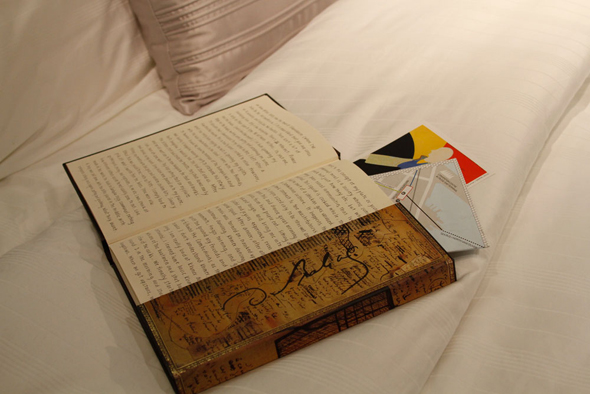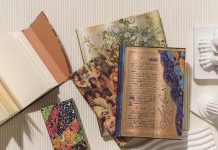Flavorwire recently posted a wonderful piece looking at what 10 famous authors have said in the past about the solitary, introspective act of keeping a diary. Inspired by that article, we decided to extract the best observations and truisms we learned about journaling from those 10 brilliant minds.
Tell us in the comments section below what you think of these insights – and, indeed, if you have any of your own – and definitely check out the full article from Flavorwire here.
1. Writing Just To Write Is Great Practice
Virginia Woolf observed that writing for no audience – writing just to write – is great practice. “It loosens the ligaments.” Her diary writing, she noted, is rough and ungrammatical. She tended to write in her diary at a quick pace, “with no more pause than is needed to put my pen in the ink”, and, though looking back on these entries was embarrassing and mortifying, she traced improvements – “some increase of ease” – in her professional writing to all those casual half hours spent with her diary.
2. Occasional Brilliance Can Arise From Lots and Lots of Writing
David Sedaris, who wrote of keeping a diary for thirty-three years, accepted that most of it is really just whining – “but every so often there’ll be something I can use later: a joke, a description, a quote.”
3. A Diary Is Not Meant for Others’ Eyes… Or Secretly Maybe It Is?
Susan Sontag talked about a time she read someone else’s journal and, specifically, about reading that persons’ true (and “curt, unfair, uncharitable”) feelings about her. “Do I feel guilty about reading what was not intended for my eyes?” she asked herself. No, she doesn’t – because she believed that one of the functions of a diary – a function we would more than likely deny to ourselves – is to be found and read. A diary is the one place where we have the opportunity and the luxury to be truly, cruelly honest, and it’s not inconceivable that we would secretly – dangerously, even – want others to learn those true thoughts.
4. Journaling Can Help You Come to Know, Understand Yourself Better
Joan Didion thoughtfully broke down why she kept a journal. Her method is typically to preserve everything she observes (from “dialogue overheard in hotels” to “impressions” of people), and while she often told herself the notebook is all about other people, she ultimately had to admit: it’s about her. “My stake is always, of course, in the unmentioned girl in the plaid silk dress. Remember what it was to be me: that is always the point.”
Anaïs Nin, on the other hand, said she writes to discover “the moments of revelation.” She actively chooses to write about heightened moments – “moments of emotional crisis” – because these are times when “human beings reveal themselves most accurately.” Keeping a diary, for her, was essentially about coming to better understand herself.
5. Keeping a Diary Can Sometimes Be An Unpleasant Trap
Joan Didion characterized the keeper of a private journal as a “different breed” of person: “lonely and resistant rearrangers of things, anxious malcontents, children afflicted apparently at birth with some presentiment of loss.” She spoke of her daughter in contrast as being the opposite of this anxious person – someone who wouldn’t have this compulsive need to write things down because she is “a singularly blessed and accepting child, delighted with life exactly as life presents itself to her, unafraid to go to sleep and unafraid to wake up.”
C.S. Lewis, also looking at the darker side of keeping a journal, wrote about the trap that one can inevitably fall into with the act of keeping a journal. Writing in his journal in a state of mourning after the death of his wife, he questioned whether writing about his grief as he did actually had the unintended effect of aggravating it.
Part of every misery is, so to speak, the misery’s shadow or reflection: the fact that you don’t merely suffer but have to keep on think about the fact that you suffer. I not only live each endless day in grief, but live each day thinking about living each day in grief. Do these notes merely aggravate that side of it? Merely confirm the monotonous, treadmill march of the mind round one subject.
But like Didion, who believed her impulse to write was a compulsion she had no control over, Lewis concluded he has no other option but to write: “But what am I to do? I must have some drug, and reading isn’t a strong enough drug now.”
6. Looking Back On Old Entries Can Lead to True Reflection & Growth
Jessamyn West very astutely said, “People who keep journals have life twice.”
Maybe what she was referring to was that you have the moment you lived and then you have the moment you’ve written about – something you can always refer back to. Franz Kafka believed that referring back to old journal entries – looking back on situations, life changes, old sufferings – gives one a kind of reassuring feeling. You look back on these situations and times – some “which today would seem unbearable” – and you realize you lived, you survived. You were even able to write it all down! And doing so can lead to great wisdom about the self.
Jonathan Franzen also talked about the insights he gained from looking back at old journal entries. He speaks of the feelings of mortification he felt from reading even day-old entries, discovering his own “fraudulence and pomposity and immaturity.” These insights made him desperate to change himself, “to sound less idiotic.” His journal entries, he attests, led him to a private commitment to personal growth.
7. Diaries Can Be An Invaluable Aid to Winning Arguments
And then there’s this gem from David Sedaris: “[Keeping a diary is] an invaluable aid when it comes to winning arguments. ‘That’s not what you said on February 3, 1996,” I’ll say to someone.”
Tell us what you think about these insights and observations below. Do you have anything interesting to add about the act of keeping a diary?
About Paperblanks®: We have been producing superb writing journals for twenty years. We are book people, and we believe that the written word matters and that our blank books have a critical role to play in the art and continued practice of writing itself. For more about Paperblanks®, go to our website at paperblanks.com.







I love this. It’s true.
I’ve kept a daily journal for almost 20 years. I agree it’s comforting to re-read entries concerning long ago troubles and to see how I survived. I employ lots of irony and outrageous sarcasm when life doesn’t cooperate, and find myself laughing out loud at events that seemed dire once upon a time. I write about my life, my partner (of 30 years)’s life, and world events. A curious friend once asked me why I wrote so compulsively and I replied, “I can’t stop time, so I try to put it on paper.”
wow @douglas i have started a diary this year only and im going good till now im 12 yrs. old i really look up to you
i hope i can do the same
Very cool! We wish you the best of luck with your first journal. As Douglas has said, you will really treasure your journals in the future.
Thanks to you both for sharing 🙂
How goes the journal? I started around your age and am still going strong 6 years later. It’s made a huge difference, especially once the addiction got its claws into me xD Never could keep up the once daily habit, but just writing whenever the mood takes you is a great trick. Go for it and good luck!
I started keeping a journal when I was your age. I am 36 years now and there is nothing more amazing than decades of your life recorded in its,most raw form, on paper, except for, maybe going back in time and reading it!
you are someone inelligent that maybe understands life wich to me is an unsolved misery that will never be solved by you get the principal of life wich is looking back on yourself and understanding your mistakes
Great work! This is the kind of information that
should be shared across the web. Shame on the search engines
for not positioning this post upper! Come on over and talk over with my site .
Thanks =)
“That’s not what you said on February 3, 1996,” I’ll say to someone.”
Made me laugh and a great example to keep a diary.
Exactly! This can help you win any argument (provided your diary backs up your memory of the events in question…
I keep journals and I loved reading this article. Thank you so much. I was particularly affected by the Joan Didion quote at #5, saying the keepers of journals were a “different breed” of people and “children afflicted apparently at birth with some presentiment of loss”… I sort of understand that.
Thank you for this lovely article, it made me learn some things about this little thing that I do. 🙂
Very motivating information you have remarked, say thanks a lot for submitting.
Ended Up reading close by . I want your stuff. Do write-up even more of this matter ok. Warm regards
Unbelievably absorbing elements you’ll have remarked, thanks a lot for posting.
I enjoyed these observations greatly. I admit most of my entries to be belly button lint. Still over the years the range of lint types gets more interesting. I am better able to share the wonder.
But I did come to this post hoping to find an app for my iPod Touch as this is where I do my journal. Any tips from the distant stars?
Cheers
keeping a diary is extremly comforting and relieveing, jzt like a bst friend, to whom we could be ourselves
Today – now sitting here with my lap top running – is the first time I have ever entered “keeping a diary” into my browser, and what is written above is interesting. I have kept a daily diary – average about 300 words – since 1958. I am only a year off of eighty now. I was, post university, to serve National Service in Britain. I was taken into the Royal Navy and, because they lliked me and me them, I did 12 years. A personal journal was required and that habit has remained with me. Many years of writing into a pad with a fountain pen. Then learning shorthand to reduce the paper volume. I have a pile of bound files in my garage here in Lincolnshire. Now, of course, I use the computer, typing eight point into a word processor, printing it when it amounts to several A4 pages, and binding it. I add an occasional page of photographs. There is an important value to keeping a diary: each evening when you put it together to record the day, you must think about what you have done and why. There is a analysis of personal behaviour and action. Wisdom is applied and tomorrow often results in amendment of today’s slight failings to get things absolutely right. I love looking back to see what I was doing on New Years Day in 1972. How much the beer cost – who was with me (often gone now) – who was running our country – ladies have given up wearing nylons – how much does it cost to fly the Atlantic? Diarying is fun and rewarding!
Hi Michael,
Wow! Nearly 60 years of journalling! It’s great to hear that you’ve managed to keep that up while incorporating digital elements like the laptop. We’d love to take a “Peek Inside” your journals and find out more about the changes you’ve tracked over the years! If you would be interested in sharing your story further with us, please send us an email at facebook@hartleyandmarks.com.
All the best,
The Paperblanks® Team
So true 🙂 😀
As a counsellor I tell my clients the reason to journal is like self-therapy. You begin to understand yourself better and your emotional reactions to life events. Knowing that emotional responses are what determines relationships you are more apt to better understand previous error and what needs adjustment. And it is documentation if anything should come to light in the future. We cannot depend on tomorrow, we only have today.
Hi Gil,
Thank you for sharing! It’s always inspiring to hear how people use journals in their everyday lives, and it is wonderful to know that you use writing as therapy in your practice.
Wishing you all the best for 2016,
The Paperblanks® Team
Woah! I’m really enjoying the template/theme of this site.
It’s simple, yet effective. A lot of times it’s tough to get that “perfect balance” between superb usability and visual appeal.
I must say that you’ve done a fantastic job with this.
In addition, the blog loads extremely quick for me
on Safari. Excellent Blog!
I enjoy, lead to I discovered exactly what I used
to be having a look for. You have ended my four day long
hunt! God Bless you man. Have a great day. Bye
I jut started book #57 yesterday, January 1, 2017. I’ve graduated from the college spirals (in block series of every color) to the 400 page year long black vinyl extravaganzas. I thought nearly 30 years was long, but the lovely gent in the U.K. got me beat by half a century. Good on him. I only need at least several large wheelbarrows to transport The Library of K.
I write out of habit now, because it’s ingrained in my behavior. It has also, most probably, saved my life considering I live in a very big city. A lot happens, and when I see something I don’t want to forget, I say to myself …”whoa, this is one for the book!”
As the decades pass, I find I’m removed from the person I was, even if it’s only a few years ago. And I’m still in the process of pulling my head out of the sand. WRITE ON!
Hi Karen,
Wow! At the rate you are writing, you should have no trouble catching up with John Gadd!
We would love to know more about the writings in the “Library of K.” If you would be in interested in sharing your story with our readers, please send us an email 🙂
All the best with #57!
The Paperblanks Team
I started writing in a green 6.5″ x 9″ spiral-bound notebook on Wednesday 11/21/79 when it was clear my now ex-wife and I were separating. As of 01/01/17, that journal (which now includes 27 ancillary titles dedicated to specific content and context) is now 3,954,423 words long. My journal has been everything from sanctuary to dungeon, best friend and mistress to a descent into madness. It is often vulgar and obscene but at times, I like to think it is also beautiful and well-written. Or as I once wrote: “I never wrote in a journal that I knew of but rather simply put myself on paper.” There are times I wish I had never written a word while simultaneously regretting I haven’t written more. And as mentioned, yes, journals are very incriminating documents. The fun, if there is any, is when people ask how I can rattle off so many specific dates about such a wide variety of experiences spanning now 37 years. Sometimes I let them think I have a really great memory but generally it leads to a discussion of writing in a journal. But one thing is absolutely true: People who write in journals, faithfully, relentlessly, obsessively, are truly “different” from everyone else. So I’ve no idea what will happen to them after I’m dead and gone. My two daughters (2nd marriage) know that one of the most important things I ever found myself writing was on Monday 07/30/12:
It is not what a man wants to do, nor what he needs to do, and not even what he does well that creates a man’s destiny. Instead it is that which he must do, the one thing he cannot not do and not try to accomplish. That one thing reveals his very purpose for being alive. It is his calling.
My journals are my calling.
I have failed, as well as failed to succeed, at everything else in life.
Lisa has my heart. These journals carry my soul. Please take care of them.
Hi Randy,
Thank you for sharing your story! What an amazing accomplishment to be able to look back at 38 years of journalling. We’re glad to hear that your journal has been such an important resource in your life, and that you’ve been able to work through your innermost feelings in good times and bad. Your journals will certainly be a treasured heirloom for your daughters and family in years to come.
Wishing you many more happy and healthy years of journalling!
Great article. I’m going through some of these issues as
well..
I am 55 years old and I have been kepping and have been writing in a diary / journal every day of every year, since 1974 when I was 11 years old.
My mother bought me my first in 1974. a small pink one, in 1975 I got a black one a little more grown up. Then in 1976 yet another just like it.
I didn’t want another but wrote in it all the same.
Then May 1976 my mother died. I couldn’t possibly stop now! My mother wanted me to write my thoughts So every year I bought a New diary. 1n 1979 I believe I could not find a diary so I didn’t write that year except in a notebook. Years later I transferred those notes into a more proper journal.
I always try to stay with the same diary each year.
the last 25 years I have been writing in Letts Of London journals. Sometimes I switch the colors. I usually decorate the front and back of it from the year of my most favorite things Or things I am passionate of and believe in. Vegetarian stickers, photos, whatever has been monumental that year.
Aside from writing I put concert tickets, playbills covers, play tickets, photographs, plane ticket stubs. For a few years in the early and mid 80’s I would have celebrity friends write me notes in it.
Every day I write my thoughts, but mostly my days events.
One year I wrote in Red Ink every day. Over the last 15 years all money I make or receive I write down.
This year each month I write in a different color ink.
I am now on my 44th book. They are all together locked away in a storage space under my desk at home. When I lived alone and before I had children I would display them with my books in my large book case.
I also have been logging my night dreams.
I started in 1977 when I was 15. I now have close to 1,400 dreams logged. They are In 5 Boorum & Pease log books with 301 pages per book. 1 Dream per page unless I remember more then 1 dream in the same night or afternoon nap that goes on the same page. I am now on my 5th book. The first book on the spine says 1977 to 1985 and so on. I am now on 2016 to ..
I truly Love books, pen & paper..
I hope that is what heaven looks like for me.
one gigantic library.
I have never met or spoken to anyone who has done what I’ve done. I have had a very colorful life So this will be interesting reading in the future.
Hi Sunday,
Thank you so much for sharing your story! What a beautiful way to stay connected to your mother, and to pass down the tradition to the next generation.
We would love to learn more about your colourful life of journalling, and are sure our readers would, too! If you would be interesting sharing more of your story in a “Peak Inside” blog article, please send us an email 🙂
Wishing you all the best,
The Paperblanks Team
Keeping a journal helps me to sort out my life, to make sense of my behavior. When things are a little off in my life, I reflect and write about it. I have been keeping a journal for over 20 years, as did my mother and my grandmother. I have thought about writing a book where I would discuss themes that arise in each person’s life. Relationships, conflicts, resolution, for example.
I also wonder if my daughters should read my diaries when I am gone. I am brutally honest in my writing and not sure I want them to read all that I have written.
Hi Liz,
Thanks for sharing! We love when journalling is passed down from generation to generation, though we certainly understand your trepidation about letting your daughters read your most private thoughts. Keeping track of different themes that come up can be really illuminating, and your idea of starting book sounds really intriguing!
Best of luck,
The Paperblanks Team
What I love about this is that it captures both the light and the dark of journaling. I fell in love with the idea of Julie Cameron’s morning pages, but found I had to stop because I was getting lost in sadness and grief. Yet I need to journal. So helpful to find your post and all the commenters.
Thank you for sharing, Lorrie! We’re so happy that this post has helped bring the positive back into journalling for you 🙂
All the best,
Robyn @ Paperblanks
I am quite interested to explore modes of diary keeping and journalling. As I contemplate my own, I’d be curious to know more about the types of formats people use. There is the romantic notion a bound moleskin with entries made regularly with a legible hand. I have found that to be unattainable, and have found my beautiful leather bound diary to be anywhere but where I was when the muse told me to make a diary entry! I have resorted to random scraps of paper, anything that is available when I feel the need to journal. My iPhone Notes pad has also become a go-to place for diary entries — all of which eventually finds it way to an electronic version. I would therefore love to hear about how others keep theirs.
Hi Leslie,
Our People of Paperblanks community could be a great resource to see how other people journal and what types of formats they use. You can join them on the People of Paperblanks Facebook Group or simply by following the #PeopleOfPaperblanks hashtag on Instagram.
I’m writing for 20 y now… Reading it now makes me so grateful for life coz I had a bad childhood and helped me alot to go forward and stay strong and to build even stronger today. I reccon you should write.
Thank you for sharing, Katarina. We are so glad to hear that journalling has helped you heal and move forward with strength.
This made me cringe harder than I’ve ever cringed before.
I’ve been journaling almost 30 years, since December 24th, 1994 to be exact. I was 11 years old when I started. Of course I couldn’t tell you I’d still be writing 20+ years down the road, but I’m sure glad I have continued this. I find writing info to be very therapeutic.
This is wonderful to hear, Amanda! We are so glad that journalling has become a helpful part of your self care. Here’s to the next 20 years!